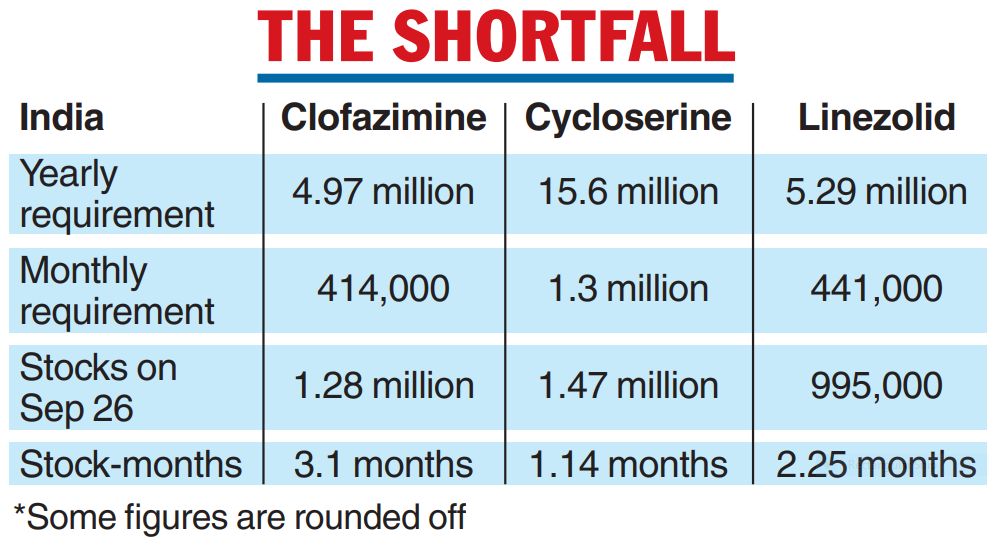Patients’ rights groups have accused the Union health ministry of denying shortages of key medicines for drug-resistant tuberculosis (TB) even though they say the ministry’s own figures of drug inventories indicate why patients are facing shortages.
Patients’ rights groups, relying on anecdotal accounts from TB patients, had in August complained to the health ministry about shortages of clofazimine, cycloserine and linezolid — three key drugs among others used to treat patients with drug-resistant TB.
The ministry on Tuesday denied shortages of anti-TB medicines, calling the reports “ill-informed and misleading”. It also released figures for stocks of various medicines available with the national TB elimination programme on September 24. The stocks include about 1.28 million clofazimine pills, 1.48 million cycloserine pills and 996,000 linezolid pills.
The ministry also named clofazimine among drugs procured in August and supplied to all states and Union Territories. It said fresh purchase orders for cycloserine and linezolid were issued in August 2023 and the drugs “are being dispatched to states”.
Members of a nationwide network of volunteers working to enhance patients’ access to medicines said government tenders for TB drug procurement from earlier this year and data on drug stocks the health ministry released on Tuesday could explain the shortages.
The tenders specify annual requirements of 4.92 million clofazimine pills, 15.6 million cycloserine pills and 1.6 million linezolid pills for distribution nationwide. Given the requirements per month, available stocks on September 24 imply clofazimine stocks for three months, cycloserine for a month, linezolid for two months. (See chart)

“The drug stocks data from the ministry also show that Maharashtra has less than a month’s supply of clofazimine and linezolid, and only about 45 days of cycloserine,” said Vaishnavi Jayakumar, a member of the network called Isthumus.
Under the “standards for stocking norms” for drug-resistant TB set by the ministry itself, every health facility that has initiated treatment for TB patients needs to maintain a “reserve stock” of the drugs for two months. The September 24 figures show that even nationwide, cycloserine stocks for only a month.
Jayakumar said under such low levels of drug stocks, many health facilities that have initiated treatment might not have enough drugs to meet the demand for patients and every patient may not be able to get all drugs in time.
“It is not enough to have stocks in a warehouse — they need to get it to every patient who needs it. Anecdotal accounts from Maharashtra, Uttar Pradesh and Bengal tell us that many patients are facing shortages of these drugs,” Jayakumar said.
A 22-year-old woman from Calcutta diagnosed with drug-resistant TB infection in the brain is among such patients. She is expected to take two pills of cycloserine every day but has not received the drug from the government TB treatment centre since August 22.
“We’ve been purchasing the medicine on our own since the end of August, but it is difficult to get it,” the patient’s sister told The Telegraph on Wednesday.
Five patients’ rights and advocacy groups said in a statement on Tuesday that they were “disheartened” by the ministry statement which they said appeared to “disregard the very real struggles and suffering endured by people on the ground”.
“For over a month, we’ve been inundated by calls from patients about drug shortages — interruptions in treatment for drug-resistant TB are particularly concerning,” said Richa Maheshwari with the Global Coalition of TB Advocates, one of the five groups. “The ministry’s complete denial was a shock.”











